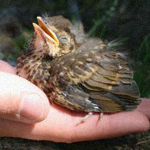One basic rule of thumb: Injured or orphaned birds do not need to have a human talking to them or music playing. Birds see us as predators, so strange sounds coming from a potential predator are anything but soothing. If you have a wild bird with you, keep as quiet as possible. With baby birds, there is also the very real danger of imprinting.
These are the most common types of calls we receive about birds:
- If someone decides to try to hatch the eggs any way, discourage them because the bird will not survive. Incubation of wild bird eggs is very difficult. An altricial newborn requires feedings every 10 minutes, 14 hours a day. If they do manage to hatch the eggs, the baby bird should be taken immediately to a bird rehabilitation center such as Le Nichoir in Hudson.
- If someone finds a baby bird, tell the homeowner to watch it for about half an hour to an hour before approaching it. Many babies are abducted by well-meaning people. If the baby has truly been abandoned, do not feed it or give it water. Adults never feed their babies water, as the food they give them has enough moisture in it to sustain them. If the homeowner attempts to give the baby water, it can breathe it into its lungs, causing pneumonia and death.
- Never give baby birds milk or bread. They are lactose intolerant and the bread can get compacted in their crop and cause death.
- It is against the law to keep wild birds in captivity without a proper permit. In addition, it is illegal to move the nest of a migratory bird. You can suggest, however, if the nest is constantly being disturbed and it is better for the nest to be moved, to gently take the nest and put it in a small box. Tie the box securely to a tree. Beware! There are nest parasites so make sure that you wash thoroughly afterwards or wear rubber gloves when handling the nest, (although most of the little bugs cannot live off a human body... they prefer feathers.)
Naked Young Birds
- Do not assume the bird is orphaned. If it is found out of the nest, warm it by holding it in your hands (gently), then replace in the nest.
- It is not true that a parent bird will not accept her young if a human has touched it.
- If it is obviously injured or deformed, keep it in a warm, dark, and quiet container until arrangements can be made with a wildlife rehabilitator.
Feathered Juveniles
- When a fledgling is found on the ground, place it gently back in a bush or tree near where it was found. The parent will continue to care for it.
- The homeowner may not try to rehabilitate orphaned birds. They must be turned over to a licensed rehabilitator such as Le Nichoir (450-458-2809). A Holding Permit must be obtained by anyone wishing to hold a migratory bird (there is actually a moratorium on permits at the moment). The exceptions are house sparrows, starlings, and pigeons.
Injured Birds
- The basic rule for injured birds is to call a rehabilitator.
- Place the bird in a warm, dark, quiet location, preferably a box with a paper towel lining the bottom. Do not put food or water in the box with the bird. Never keep a bird wrapped in a towel, as they can overheat quite easily. Never place grass in the box, as it will cool the animal as it dries.
- If it is a window strike, place the boxed-bird in a warm, quiet place for about 30 minutes. Do not peek or check on it. After half an hour, take the box outside without opening it. When outside, open the lid. If the bird was simply stunned, it should fly off. It the bird does not fly off or if it leaves the box and flutters to the ground, bring it to a rehab clinic.
- If the bird is showing the following signs: fluffed up feathers, beak open, wings drooping, panting, head falling down, it is probably suffering from dehydration. The solution is to place in a large box in a cool, dark place and give it Gatorade cut with water. When the bird is rehydrated (a few hours), the homeowner can release it.
- For birds that have been caught by a cat, consider them injured even if they do not show any outward signs. Cats house bacteria that are lethal to birds, so bring them to a rehab clinic.
- Never attempt to capture a heron or bittern, as they can inflict fatal wounds.

